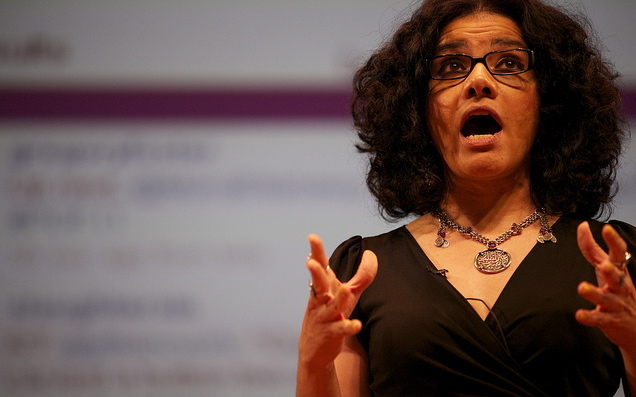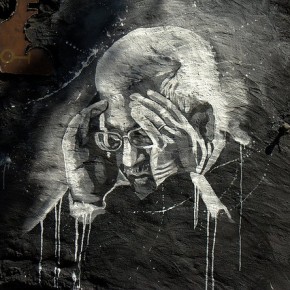Perhaps it is not my place to comment on your über-feminist “Why Do They Hate US?” eureka moment, since it almost exclusively focuses on the Arab world. You have every right to roll your eyes and think: “there goes the Iranian again, crashing our party and sticking her nose where it doesn’t belong.”
But here’s the thing: while your piece in Foreign Policy ostensibly addresses the Arab world, it ultimately targets an entire region and an entire religion that I happen to be a part of. Thus you have dragged me into this, unwittingly for all one knows, and thus you have to bear with me, and hear me out.
I have no intention of joining the visceral bandwagon of tweets, blogs and articles currently raging against you. Roqayah Chamseddine of the Frustrated Arab says your piece “superficially condenses a complex subject into an easy-to-swallow ‘them vs. us’ dichotomy,” while Hossam Bahgat of the Egyptian Initiative for Personal Rights believes “the Arab/Muslim men hate women is not only Orientalist but also prevents dialogue and closes any window for change.”
I don’t deny the gender-based discriminations against women in the Middle East, and I share many of the ideals you cherish in your article. However, your approach, which I believe is narratively and ideologically as extreme as the patriarchal society you take aim at, is highly unconstructive, not to mention detrimental, to the very women whose rights and freedoms you claim to be advocating.
In four pages of journalistic melodrama, you warn against the inexorable rise of Arab misogyny and the perilous war it has waged against women in the region. “Arab men hate Arab women,” is the main argument you repeatedly belabor while wading in and out of reports and statistics of genital mutilation, gang-rapes, humiliating virginity tests, underage Arab girls dying at childbirth, and last but not least, Egyptian criminal codes that strip women of their most basic rights. This, according to you, boils down to the simple truth: women are hated! They are hated by men. They are hated by society. They are even hated by what you describe as a “misogynistic” god. They are cheap bargaining chips that are treated like animals. They have fallen pray to an “Islamist hatred of women that burns brightly across the region”. They are blind to rampant misogyny when it rears its ugly head, and thus they are victims of their own ignorance even at a time of regional change and revolution
Indeed, you paint the women of our region as submissive and almost masochistic individuals, who are devoid of any social agency or personal autonomy. You fulminate against them for not trying enough to break free from the tentacles of patriarchy in a condescending tenor that suggests a simplistic conceptualization of feminism that stigmatizes and infantilizes both men and women.
It goes without saying that the “revolution of thought” mentioned in your piece is of great significance at this juncture. All the same, it cannot be realized overnight, nor can it be attained as long as you walk in the footsteps of radical feminists who conflate the idea of a “sexual revolution” à la 1960s Greenwich Village as a sine qua non of a social revolution.
“In her sloppy indictment of Arabs, Muslims, authoritarian rulers, and Islamists, El Tahawy has papered over some messy issues that complicate her underlying message: liberalism is the solution… El Tahawy’s presumes that she is starting a conversation. We respectfully invite El Tahawy to join the conversation among women and men in Tahrir and outside of it,” wrote Sherene Seikaly and Maya Mikdashi in Jadaliyya last week.
The detailed accounts and statistics you provide– as valid and telling as they may be–fail to deepen our understanding of the crux of the issues facing Arab women. Rather, they create an essentialized and homogenized representation of the complex identities and diversities in the region. The same could be said about your personal anecdotes, which do not even prevail upon those of us with similar experiences. I was also jolted when, after having grown up in London, my parents decided to move us back to Iran in the early 1990s. At a very young age, I found myself in a stringent theocratic society, where I was required to wear a headscarf and adhere to a certain dress code against my will. Am I against the forced-veiling of women, and any other government effort that has for thirty years treated individual bodies as public property? Absolutely. Do I believe that Iranian women are oppressed, helpless and disempowered by this? Not in the least.
The lack of social and political freedom in Iran is without a doubt frustrating, but it did not “traumatize me into feminism,” as you put it. Quite the contrary, it all the more introduced me to the indomitable spirit of Iranian women and men who are actively exploring, realizing, and renegotiating their rights through various legal proceedings or dialogical avenues, whether at university or at family courts. By resisting authority and challenging state-inscribed roles, they are slowly but surely chipping away at the armor of the patriarchal theocracy.
While at university in Tehran, I became closely familiar with “Change for Equality”—a women’s rights advocacy group comprised of both Iranian men and women and one of the many social movements pressing for change and cultural awareness about women’s rights. Since its inception in 2006, the group has braved arrests, interrogations, and a slew of other retributions. Many of the group’s members –including human rights lawyer Nasrin Sotudeh and women’s rights activist Bahareh Hedayat – still remain behind bars; but this has not diverted them from their cause. If anything, it has caused it to go even beyond the issue of women’s rights. Last month, when the war rhetoric against Iran reached a crescendo, the group released a series of online videos warning of the humanitarian and social consequences of military confrontation.
Such progress is not only limited to Iran. It is taking place across the region at a slow but steady pace. We should embrace it and, in doing so, we should draw a line between constructive consciousness-raising and extremist gender-marginalizing discourse, which relies on shock value to shape people’s minds and opinions.
After all, as Nesrine Malik reminds us in The Guardian, the fight is against patriarchy, not men. We should not allow the dialogue and our approach to promote gender equality and women’s rights degenerate into reactionary essentialism, whether in the form of misogyny or misandry.
Photograph courtesy of personaldemocracy. Published under a Creative Commons license.





